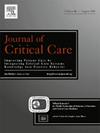重症监护的环境可持续性:重症监护专业人员的观点、实践和对欧洲重症监护医学学会的建议的国际调查
IF 3.2
3区 医学
Q2 CRITICAL CARE MEDICINE
引用次数: 0
摘要
重症监护室(ICU)是一个资源丰富的领域,比标准医院病房产生更多的废物和温室气体(GHG)排放。环境可持续性对全世界的医疗保健专业人员都很重要,这促使科学协会呼吁采取紧急行动。为了响应这一全球需求,欧洲重症监护医学学会(ESICM)进行了一项国际调查,评估重症监护专业人员对环境可持续性的态度和做法。方法重症监护专业人员于2023年10月21日至2024年1月5日完成在线调查。该调查包含21个问题,评估了ESICM对环境可持续性的态度和实践,以及ESICM的行动建议,在第36届ESICM大会期间通过国家重症监护协会和ESICM的社交媒体进行了传播。结果我们收到了来自48个国家的635份回复。470名(80%)受访者承认有责任意识到重症监护实践对环境的影响,372名(63.5%)受访者不同意或不确定他们指导实践的知识水平。437人(84%)缺乏做出可持续选择的正规培训。95%的人在重症监护室使用非无菌手套,63%的人愿意减少使用以支持可持续做法。ESICM改善环境可持续性的两项拟议行动是增加生态学知识(91/187,49%)和提高该领域的认识(36/187,20%)。这项调查强调了科学协会,特别是ESICM,在环境可持续性方面提供强有力的支持和结构化教育的必要性。重症监护专业人员承认重症监护对环境的影响,似乎渴望在这方面的教育上投资。本文章由计算机程序翻译,如有差异,请以英文原文为准。

Environmental sustainability in intensive care: An international survey of intensive care professionals‘views, practices and proposals to the European Society of Intensive Care Medicine
Background
The intensive care unit (ICU) is a high-resource area, generating more waste and greenhouse gas (GHG) emissions than standard hospital wards. Environmental sustainability is important for healthcare professionals worldwide, prompting scientific societies to call for urgent action. To respond to this global need, the European Society of Intensive Care Medicine (ESICM) conducted an international survey assessing intensive care professionals' attitudes and practices towards environmental sustainability.
Methods
Intensive care professionals completed an online survey between 21 October 2023, and 5 January 2024. The survey, featuring 21 questions assessing attitudes and practices towards environmental sustainability and proposals for actions from ESICM, was disseminated during the 36th ESICM Congress via National Intensive Care Societies and ESICM's social media.
Results
We received 635 responses from 48 countries. Four hundred seventy (80 %) respondents acknowledged a responsibility to be aware of the environmental impact of intensive care practice, and 372 (63.5 %) disagreed or were uncertain about their knowledge level to guide practice. Four hundred thirty-seven (84 %) lacked formal training on making sustainable choices. Ninety-five per cent used non-sterile gloves in ICUs, and 63 % were willing to reduce use to support sustainable practices. Two proposed actions for ESICM to improve environmental sustainability were increasing knowledge on ecology (91/187, 49 %) and raising awareness in the field (36/187,20 %).
Conclusion
This survey highlighted the need for scientific societies, notably ESICM, to provide robust support and structured education on environmental sustainability. Intensive care professionals acknowledged the environmental impact of intensive care and seemed eager to invest in their education on this topic.
求助全文
通过发布文献求助,成功后即可免费获取论文全文。
去求助
来源期刊

Journal of critical care
医学-危重病医学
CiteScore
8.60
自引率
2.70%
发文量
237
审稿时长
23 days
期刊介绍:
The Journal of Critical Care, the official publication of the World Federation of Societies of Intensive and Critical Care Medicine (WFSICCM), is a leading international, peer-reviewed journal providing original research, review articles, tutorials, and invited articles for physicians and allied health professionals involved in treating the critically ill. The Journal aims to improve patient care by furthering understanding of health systems research and its integration into clinical practice.
The Journal will include articles which discuss:
All aspects of health services research in critical care
System based practice in anesthesiology, perioperative and critical care medicine
The interface between anesthesiology, critical care medicine and pain
Integrating intraoperative management in preparation for postoperative critical care management and recovery
Optimizing patient management, i.e., exploring the interface between evidence-based principles or clinical insight into management and care of complex patients
The team approach in the OR and ICU
System-based research
Medical ethics
Technology in medicine
Seminars discussing current, state of the art, and sometimes controversial topics in anesthesiology, critical care medicine, and professional education
Residency Education.
 求助内容:
求助内容: 应助结果提醒方式:
应助结果提醒方式:


